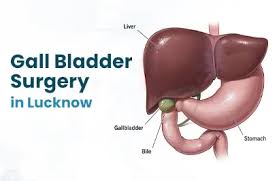The human body is a remarkable system composed of numerous organs that work in harmony to maintain health and functionality. However, there are times when certain organs may encounter issues that require medical intervention. One such organ that frequently faces complications is the gall bladder. When problems arise, gall bladder surgery, known as cholecystectomy, may be necessary to restore health and well-being. If you are experiencing gall bladder-related issues and are seeking a dependable hospital for gall bladder surgery in Lucknow, understanding the procedure and the available options can help you make informed decisions about your healthcare.
The Role of the Gall Bladder
The gall bladder is a small, pear-shaped organ located beneath the liver on the right side of the abdomen. Its primary function is to store bile, a digestive fluid produced by the liver that helps break down fats in the digestive process. When you eat, the gall bladder releases bile into the small intestine to aid digestion. Despite its essential role, the gall bladder can develop problems that necessitate surgical intervention.
Common Gall Bladder Issues
Several conditions can affect the gall bladder, leading to discomfort and the need for medical attention:
1. Gallstones
Gallstones are hardened deposits of digestive fluid that can form in the gall bladder. They can range in size from a grain of sand to a golf ball and may cause intense pain, nausea, vomiting, and inflammation if they block the bile ducts.
2. Cholecystitis
Cholecystitis is the inflammation of the gall bladder, often caused by gallstones blocking the cystic duct. This condition can lead to severe abdominal pain, fever, and digestive disturbances.
3. Biliary Dyskinesia
Biliary dyskinesia is a condition where the gall bladder does not empty bile properly, causing abdominal pain and digestive issues. It is often diagnosed through tests that assess the gall bladder's functionality.
4. Gall Bladder Polyps
Gall bladder polyps are growths that protrude from the lining of the gall bladder. While most polyps are benign, larger ones may increase the risk of gall bladder cancer and require monitoring or removal.
The Importance of Gall Bladder Surgery
When gall bladder issues become severe or recurrent, surgery may be the most effective treatment option. Cholecystectomy, the surgical removal of the gall bladder, is a common procedure that can alleviate symptoms and prevent further complications. The surgery can be performed using different techniques:
1. Laparoscopic Cholecystectomy
Laparoscopic cholecystectomy is a minimally invasive procedure that involves making small incisions in the abdomen and using a laparoscope (a thin tube with a camera) to guide the surgeon in removing the gall bladder. This approach offers several benefits, including reduced pain, shorter recovery time, and minimal scarring.
2. Open Cholecystectomy
In some cases, an open cholecystectomy may be necessary. This traditional approach involves a larger incision in the abdomen to access and remove the gall bladder. It is typically used when there are complications or anatomical variations that make laparoscopic surgery challenging.
Preparing for Gall Bladder Surgery
Before undergoing gall bladder surgery, patients will undergo a thorough evaluation to assess their overall health and determine the best surgical approach. The preparation process may include:
1. Medical Evaluation
A comprehensive medical evaluation will help identify any underlying health conditions that may affect the surgery or recovery. This may include blood tests, imaging studies, and consultations with specialists.
2. Preoperative Instructions
Patients will receive specific preoperative instructions, such as fasting before the surgery and discontinuing certain medications. Following these instructions is crucial for a safe and successful procedure.
Recovery and Postoperative Care
After gall bladder surgery, patients can expect a period of recovery and follow-up care to ensure optimal healing and well-being:
1. Hospital Stay
Most patients undergoing laparoscopic cholecystectomy can return home the same day or the following day. However, an open cholecystectomy may require a longer hospital stay.
2. Pain Management
Pain management is an essential aspect of postoperative care. Patients will receive medications to alleviate pain and discomfort during recovery.
3. Dietary Adjustments
Following surgery, patients may need to make temporary dietary adjustments to allow the digestive system to adapt. A gradual return to a normal diet is typically recommended.
4. Follow-Up Appointments
Regular follow-up appointments with the surgeon will help monitor the patient's progress and address any concerns or complications that may arise.
Choosing a Reliable Hospital for Gall Bladder Surgery in Lucknow
When considering gall bladder surgery, selecting a reputable hospital is crucial for ensuring a successful outcome. Here are some factors to consider when choosing a hospital in Lucknow:
1. Experienced Surgeons
Look for a hospital with experienced surgeons specializing in gall bladder surgery in Lucknow. Their expertise and skill are critical for performing the procedure safely and effectively.
2. Advanced Facilities
A hospital equipped with advanced facilities and state-of-the-art technology can enhance the quality of care and improve surgical outcomes.
3. Comprehensive Care
Choose a hospital that offers comprehensive care, including preoperative evaluation, postoperative follow-up, and access to specialized medical professionals.
4. Patient Reviews and Reputation
Patient reviews and the hospital's reputation can provide valuable insights into the quality of care and patient satisfaction. Consider hospitals with positive reviews and a strong track record of successful outcomes.
Conclusion
Gall bladder surgery is a common and effective solution for addressing various gall bladder-related issues. Understanding the procedure, preparation, and recovery process can help patients make informed decisions about their healthcare. If you are seeking a reliable hospital for gall bladder surgery in Lucknow, consider factors such as experienced surgeons, advanced facilities, and comprehensive care. By choosing a reputable hospital, you can ensure a safe and successful surgery, leading to improved health and quality of life.





Comments